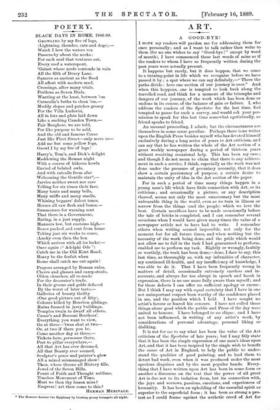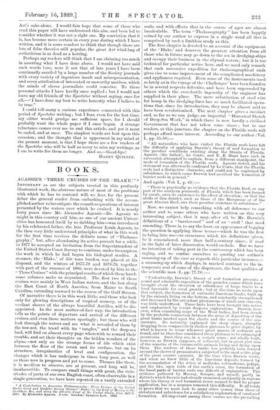ART.
A GOOD-BYE!
I HOPE my readers will pardon me for addressing them for once personally ; and as I want to talk rather than write to them (for no one wishes to say "Good-bye !" except by word. of mouth), I have commenced these last words of mine as if the readers to whom I have so frequently written during the past years were actually present.
It happens but rarely, but it does happen, that we come to a turning-point in life which we recognise before we have
passed it by ; a spot where we can say definitely,—" There the paths divide : here one section of our journey is over." And when this happens, one is tempted to look back along the travelled road, and think for a moment of the triumphs and dangers of our journey, of the work which has been done or undone in its course, of the balance of gain or failure. I, who address the readers of the Spectator• for the last time, feel tempted to pause for such a survey, and would ask your per- mission to speak for this last time somewhat egotistically, as friend speaks to friend.
An unusual proceeding, I admit; but the circumstances are
themselves in some sense peculiar. Perhaps there is no writer upon the English Press besides myself who has devoted himself exclusively during a long series of years to Art criticism, and can say that he has written the whole of the Art section of a great weekly newspaper during a period of thirteen years without receiving occasional help. This has been my case and though I do not mean to claim that there is any achieve- ment in such a service, I think, especially as the work was not done under the pressure of pecuniary necessity, that it does show a certain persistency of purpose, a certain desire to maintain the unity of idea in the Art section of the paper.
For in such a period of time many things happen in a
young man's life which have little connection with Art, or its criticism ; and occasionally a picture, or any description. thereof, seems not only the most unnecessary but the most unbearable thing in the world, even as we turn in illness or sorrow from the things (and the people) which we love the best. Certain sacrifices have to be made occasionally before the tale of bricks is completed, and I can remember several. occasions when I would have given many times the value of a newspaper article not to have had to write. I remember others when writing seemed impossible, not only for the- moment but for all future times, and when nothing but the necessity of the work being done, and the pride which would not allow me to fail in the task I had guaranteed to perform,. enabled me to perform my task. Rightly or wrongly, faultily or worthily, the work has been done,—done, I dare to say, this last time, as thoroughly as, with my infirmities of character,. my continued ill-health, and my insufficiency of knowledge, I was able to do it. That I have been frequently wrong in. matters of detail, occasionally extremely careless and in- accurate, and always far too abrupt in speech and harsh in expression, there is no one more fully aware than myself; and for these defects I can offer no sufficient apology or excuse.. But I think I may say with equal certainty that I have in one not unimportant respect been worthy of the confidence placed in me, and the position which I held. I have sought no artist's favour or feared his censure. I have not called those things alone good which the public and Press of the day were united to honour. I have belonged to no clique ; and I have- not been influenced, in writing of any artist's work, by considerations of personal advantage, personal liking or disliking.
It is not for me to say what has been the value of the Art
criticism of the Spectator of late years; but I may fitly state that it has been the simple expression of one man's ideas upon. Art, and that it has been inspired by the single wish to benefit the cause of Art in England, to help the public to under- stand the qualities of good painting, and to lead them to detect bad work, even when it was produced under the most specious disguises and by the most popular hands. Every- thing that I have written upon Art has been in some form or another a discourse on the text that the power of all great Art is due not to its isolation from, but its connection with, the joys and sorrows, passions, emotions, and experiences of humanity. It has been an upholding of the essential spirit as superior to the superficial form ; it has been as strong a pro- test as I could frame against the aesthetic creed of Art for
Art's sake alone. I would fain hope that some of those who read this paper will have understood this aim, and been led to consider whether it was not a right one. My conviction that it is, has become more certain in every year during which I have written, and it is some comfort to think that though there are lots of false theories still popular, the great Art wind-bag of aestheticism is as dead as a herring.
Perhaps my readers will think that I am claiming too much in asserting what I have done above. I would not have said such words Lere, were it not that of late years I have been continually assailed by a large number• of the Society journals with every variety of ingenious insult and misrepresentation, and every attribution of interested or unworthy motives, which the minds of clever journalists could conceive. To these personal attacks I have hardly once replied ; but I would not leave my old friends of the Spectator without saying, once for• all,—" I have done my best to write honestly what I believe to he true."
I could tell many a curious experience connected with this period of Spectator writing ; but I fear, even for• the last time, my editor would grudge me sufficient space, for I should probably want the whole paper if I once began. A strange reluctance comes over me to end this article, and yet it must be ended, and at once. The simplest words are best upon this occasion; and the thought that is uppermost in my mind at the present moment, is that I hope there ar•e a few readers of the Spectator who will be half as sorry to miss my writings, as I am to write for them no longer. And so,—Good-bye!
HARRY QUILTER.







































 Previous page
Previous page